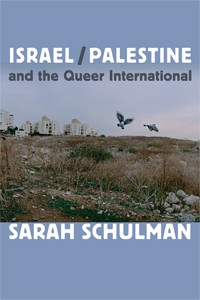Review of Sarah Schulman’s Pinkwashing Book
Does Israel ‘Pinkwash’?
 Israel/Palestine and the Queer International
Israel/Palestine and the Queer International
by Sarah Schulman
Duke University Press. 208 pages, $22.95
SARAH SCHULMAN’S new book, Israel/Palestine and the Queer International, is a triple cause of delight for me. Schulman is a renowned Jewish-American lesbian activist who describes here her visit to Israel and entry “into a relationship with Palestine.” I am a gay Israeli living in the U.S, in fact in New York (attending graduate school), the city that Sarah Schulman has called home for her entire life.
Her new interest began with a twist. A professor at the College of Staten Island of CUNY, Schulman was invited to deliver a keynote speech at Israel’s GLBT studies conference at Tel Aviv University in spring 2010. While not actively involved in Israeli-Palestinian issues before, she decided to turn down the invitation to honor a Palestinian call for a boycott on Israeli institutions. But the invitation prompted her to travel to Israel privately.
Schulman spends the first half the book talking about her “solidarity visit”–by which she means solidarity with both the Israeli and Palestinian peoples, especially GLBT people among both. She also had a more specific goal: to commit the Palestinian organizers of the boycott to the GLBT agenda: “If people like me are going to turn our backs on queer events in support of the boycott, then we must be assured that the boycott both recognizes queer support and acknowledges Palestinian GLBT organizing.” To Schulman’s credit, she clarifies: “I am occupying a very tiny zone in between many worlds, none of which I know anything about.”
Schulman provides a detailed account of the preparations for her trip: reaching out to like-minded Israelis and Palestinians; educating herself about Israel by watching alternative movies at a film festival; speaking to her Israeli relatives and acquaintances in New York. She ended up delivering her talk, after all–at a Tel Aviv cafe. Doubtless the audience was pretty much the same as it would have been at the conference; even the professor who’d invited her to keynote was on hand.
The book’s second part describes what happened when Schulman returned home, when she organized a speaking tour in the U.S. for three GLBT Palestinian-Israeli activists. The most prominent among them was Haneen Maikey, the executive director of Al Qaws for Sexual & Gender Diversity in Palestinian Society. Parenthetically, Schulman often blurs the distinction between Palestinians who are Israeli and those who are not.
Schulman’s path and mine crossed at an event described under the heading “backlash.” In 2011, a group tried to meet at the GLBT Community Center in New York to combat what they called “Israeli apartheid” against Palestinians. After protests organized by Michael Lucas, a prominent gay adult film producer, the Center decided not to provide space for the event. When the decision blew up into GLBT internecine warfare in Manhattan, the Center convened a town hall meeting to discuss it. This is where I make my implicit appearance in the book, as one of the “three other gay Israeli men” sitting next to Lucas.
In her odyssey to political awareness, Schulman makes no effort to distill the important from the trivial. The narrative unveils the world as seen through her eyes, but it sometimes feels as if written by someone who posted her trip on Facebook. She quotes technical e-mail exchanges and mentions by name practically every person she met or communicated with. But the breadth of reporting may come at the expense of depth. I wish Schulman had given more space to Haneen Maikey. I met Maikey when I was a board member of the Jerusalem Open House, the city’s GLBT organization from which Al Qaws emerged. I share Schulman’s opinion of Maikey as a thoughtful, compelling leader, so I hoped for insights into her thinking and life rather than political sound bites and repetitious, however well-deserved, superlatives.
Schulman became committed not only to Palestinian independence but also to the boycott, even regretting that she flew to Israel on El Al. She has also emerged as a prominent campaigner against “pinkwashing,” seen as a well-funded public relations campaign to highlight Israel’s approach to gay rights as a way to “pinkwash” its treatment of Palestinians. I find Schulman’s pinkwashing argument unconvincing. She believes Israel has a top-down, carefully executed policy with a budget in the millions to implement this image-enhancing strategy. Israel has no such thing. Indeed, it would be a significant step forward if Israel finally became more savvy and sensitive about its international image. It might contribute to accountability with respect to both GLBT and Palestinian issues.
Curiously enough, Schulman falls into the dynamics of pinkwashing herself when, upon traveling to Palestine during her solidarity visit, she “started thinking as an American.” On the spot, she devises a strategy for the Palestinians. She recommends installing a “go-to’ person for the U.S. media.” The ideal candidate should be “younger, hipper, sophisticated, funny, attractive U.S.-educated man or woman who knows American culture and can simply make the case, with charm.” There’s more: “Maybe someone openly gay?” But since the Palestinians didn’t rush to pick up her strategy, she seems to have felt compelled to do the job herself: she wrote this book.